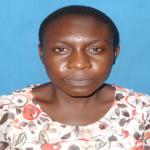
Student Short Biography:
Hellen Nekesa Sakwa is a secondary school teacher employed by the Teachers Service Commission (TSC) and currently serving in Teso North Sub-County, Busia County. She was born on 14th September 1986 in Kitale Town, Trans-Nzoia County. She attended Shimo-la-Tewa Primary School in Kitale Municipality and Shikuku FYM Primary School. After passing her Kenya Certificate of Primary Education (KCPE) examinations in 2000, Hellen was admitted to Kuywa Girls Secondary School for her secondary schooling and later sat for her Kenya Certificate of Secondary Education (KCSE) examinations in 2000. She joined Moi University for undergraduate studies in 2007 and graduated with a Bachelor of Education (Arts) Second Class, Upper Division in 2011. She was employed by TSC in 2012 and posted to Buna Secondary School, Wajir County where she worked up to 2016 when she got transferred to her current station, St. Josephs’ Secondary School, Kocholia in Busia County. Her Master’s journey in Education started in 2012 and decided to research on the above topic while after noticing serious challenges that girls in pastoralist communities faced in education. Apart from her duties as a teaching, Hellen also guides and counsels’ female students on challenges associated with co-educational schools.
Project Summary
EFFECTS OF EARLY MARRIAGES ON THE EDUCATION OF PRIMARY SCHOOL GIRLS IN BUNA SUB-COUNTY, WAJIR COUNTY, KENYA.
Kenya has performed fairly well in promoting the education of her people especially at the basic level nationally. However, impressive as it is, this picture hides major disparities in the regions especially in the arid and semi-arid areas (ASALs). Gender disparities are quite glaring because of the effects of some of the harmful and retrogressive traditional practices like female genital mutilation/cutting (FGM/C and early marriages that girls are subjected to at a tender age. This study examined the effects of early marriages on the primary education of girls in Buna Sub-County, Wajir County. Apart from establishing the causes of early marriages, the study also looked at its impact on participation and completion of girls in the sub county as well as establishing some of the possible solutions to the problem of early marriages and the education of girls in Buna Sub County. The descriptive research design was used to execute the study. The simple random sampling method realized a sample size of 159 (114 standard seven and eight pupils, 39 teachers, and 6 head teachers) drawn from six schools. The total respondents for the study were 133 (97 pupils, 30 teachers, and 6 head teachers) which were drawn from the four schools that participated in the study. Data was collected by use of three sets of questionnaires (pupils, teachers and head teachers), and analyzed by Statistical Package for Social Sciences (SPSS). The findings were mainly presented in the descriptive statistical format using tables, pie charts and graphs. The study revealed that early marriages were real in Buna Sub-County and they have negatively affected the education of girls. This resulted from poverty, high levels of illiteracy, regional customs as well as the retrogressive traditional customs. The Somali community generally socializes its girls for domestic duties so that they make good wives once they get married. Girls are generally viewed negatively by members of the community who feel that educating them is like educating someone else’s wife and therefore preference will be given to the boys over girls when both cannot be supported in school. The predominant Muslim religious beliefs in the area also subject these girls to retrogressive practices such as FGM/C that is commonly seen as an immediate preparation for early marriages. The completion rates were found to be poor due to early Marriages which happen when girls are between the age 14 and 17 years. The girls are kept out of school despite free primary education and terminate their schooling before completing 12 years of compulsory learning. Unfortunately, this works against the high hopes and aspirations that many primary school pupils in Buna Sub-County hold. Some of the key intervention measures to the problem of early marriages are; strengthening guidance and counseling services in schools to offer support to girls, offering conditional cash transfers both to the girls and parents, increasing the number of female teachers in schools to incentivize the girls as role models, sensitizing parents and the entire community on the risks that girls get subjected to by engaging in early marriages, and punishing the offenders. The study recommended punitive measures be put in place for deterrence purposes. A part from this the community ought to be sensitized, first on the harmful effects of early marriages and secondly on the need to change the negative attitude they hold not just towards the girls but to their education in particular.
